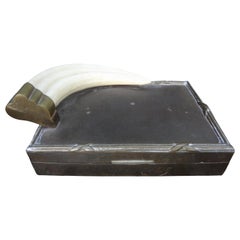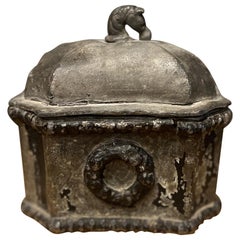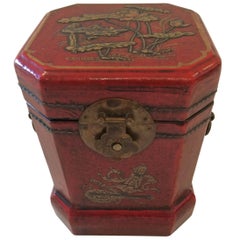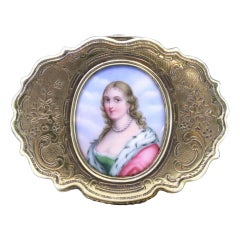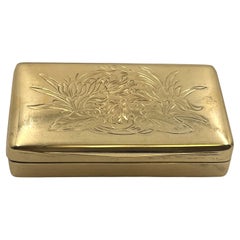Snuff Boxes and Tobacco Boxes
20th Century European Snuff Boxes and Tobacco Boxes
Silver
1960s Indian Hollywood Regency Vintage Snuff Boxes and Tobacco Boxes
Brass
Mid-18th Century British Neoclassical Antique Snuff Boxes and Tobacco Boxes
Lead
1940s Chinese Chinoiserie Vintage Snuff Boxes and Tobacco Boxes
Leather
19th Century European Antique Snuff Boxes and Tobacco Boxes
Silver
19th Century Swedish Antique Snuff Boxes and Tobacco Boxes
Silver
Early 19th Century English Georgian Antique Snuff Boxes and Tobacco Boxes
Sterling Silver
17th Century Dutch Antique Snuff Boxes and Tobacco Boxes
Silver
19th Century Swiss Black Forest Antique Snuff Boxes and Tobacco Boxes
Fruitwood
1970s French French Provincial Vintage Snuff Boxes and Tobacco Boxes
Brass
18th Century English Other Antique Snuff Boxes and Tobacco Boxes
Agate, Gold
1950s Italian Mid-Century Modern Vintage Snuff Boxes and Tobacco Boxes
Brass
Early 19th Century English Georgian Antique Snuff Boxes and Tobacco Boxes
Birch
1840s British Victorian Antique Snuff Boxes and Tobacco Boxes
Silver, Sterling Silver
19th Century Chinese Qing Antique Snuff Boxes and Tobacco Boxes
Brass
1860s British Victorian Antique Snuff Boxes and Tobacco Boxes
Sterling Silver
18th Century French Rococo Antique Snuff Boxes and Tobacco Boxes
Silver
1850s Russian Antique Snuff Boxes and Tobacco Boxes
Silver
19th Century Chinese Chinese Export Antique Snuff Boxes and Tobacco Boxes
Porcelain
18th Century English Rococo Antique Snuff Boxes and Tobacco Boxes
Bronze, Enamel
19th Century British Anglo-Indian Antique Snuff Boxes and Tobacco Boxes
Brass
1870s English Victorian Antique Snuff Boxes and Tobacco Boxes
Silver, Sterling Silver
1890s British Victorian Antique Snuff Boxes and Tobacco Boxes
Sterling Silver, Enamel
19th Century French Louis XV Antique Snuff Boxes and Tobacco Boxes
Silver, Enamel
19th Century Austrian Antique Snuff Boxes and Tobacco Boxes
Terracotta
19th Century European Antique Snuff Boxes and Tobacco Boxes
Silver
19th Century European Antique Snuff Boxes and Tobacco Boxes
Silver
Early 20th Century European Snuff Boxes and Tobacco Boxes
Silver
20th Century European Snuff Boxes and Tobacco Boxes
Silver
20th Century European Snuff Boxes and Tobacco Boxes
Silver
19th Century European Antique Snuff Boxes and Tobacco Boxes
Silver
20th Century European Snuff Boxes and Tobacco Boxes
Silver
19th Century European Antique Snuff Boxes and Tobacco Boxes
Silver
20th Century European Snuff Boxes and Tobacco Boxes
Silver
19th Century European Antique Snuff Boxes and Tobacco Boxes
Silver
19th Century European Antique Snuff Boxes and Tobacco Boxes
Silver
19th Century European Antique Snuff Boxes and Tobacco Boxes
Silver
19th Century European Antique Snuff Boxes and Tobacco Boxes
Silver
19th Century European Antique Snuff Boxes and Tobacco Boxes
Silver
20th Century European Snuff Boxes and Tobacco Boxes
Silver
19th Century European Antique Snuff Boxes and Tobacco Boxes
Silver
19th Century European Antique Snuff Boxes and Tobacco Boxes
Silver
19th Century European Antique Snuff Boxes and Tobacco Boxes
Silver
20th Century European Snuff Boxes and Tobacco Boxes
Silver
Early 19th Century European Antique Snuff Boxes and Tobacco Boxes
Silver
19th Century European Antique Snuff Boxes and Tobacco Boxes
Silver
Early 19th Century European Antique Snuff Boxes and Tobacco Boxes
Silver
20th Century European Snuff Boxes and Tobacco Boxes
Silver
19th Century European Antique Snuff Boxes and Tobacco Boxes
Silver
Early 18th Century European Antique Snuff Boxes and Tobacco Boxes
Silver
19th Century European Antique Snuff Boxes and Tobacco Boxes
Silver
Early 18th Century European Antique Snuff Boxes and Tobacco Boxes
Silver
19th Century European Antique Snuff Boxes and Tobacco Boxes
Silver
18th Century European Antique Snuff Boxes and Tobacco Boxes
Silver
19th Century European Antique Snuff Boxes and Tobacco Boxes
Silver
19th Century European Antique Snuff Boxes and Tobacco Boxes
Silver
Early 20th Century Chinese Minimalist Snuff Boxes and Tobacco Boxes
Brass, Copper
Late 19th Century French Victorian Antique Snuff Boxes and Tobacco Boxes
Elm
1970s Italian Art Nouveau Vintage Snuff Boxes and Tobacco Boxes
Sterling Silver, Enamel
1920s Austrian Art Deco Vintage Snuff Boxes and Tobacco Boxes
Alpaca
Antique Snuffboxes for Sale on 1stDibs
Today antique snuffboxes and tobacco boxes — as well as a lot of other vintage tobacco accessories — are collectibles and charming pieces of decor for any display case or to elevate your bookshelves.
Snuff, made of ground tobacco, was especially popular with Europeans in the 1600s. The ornate boxes to keep the powder dry became highly decorative by the 18th century. It was considered a must-have item, particularly for nobility.
The most important feature of a snuffbox was that it was airtight. The box protected the snuff from oxygen. Another crucial component was the flat lid.
Snuffboxes could be small enough to fit into a pocket or a larger container for communal use at the table. They also came in different shapes. Porcelain containers were prevalent and often designed to look like trunks. Others were oval or square. Boxes made with cowrie shells were rare and more expensive.
Snuffboxes were usually crafted from silver, gold, horn or tortoiseshell. Some of the most prestigious snuffboxes were French tabatières made of gold and sometimes glass. They could be adorned with amethysts, sapphires and diamonds and enameled, engraved or chased.
Sheffield, England, was known for its silver snuffboxes in the late 18th century as its silver-plating technologies perfected these containers. By the early 19th century, the silver industry in Birmingham, England, was producing elegant snuffboxes with images of abbeys and castles on the sides and top.
Another type of tobacco box was the snuff mull or mill. It was made out of horn or an entire ram’s head and topped with a metal lid, frequently featuring engravings and decorative hinges. These were fashionable in Scotland during the 19th century. The origin of its name is unclear.
On 1stDibs, find a plentiful range of antique snuffboxes and tobacco boxes to complement any home decor or furniture style. You can browse the collection by style, which includes Victorian, Georgian and Art Deco, or by material to find pieces in silver and gold.

